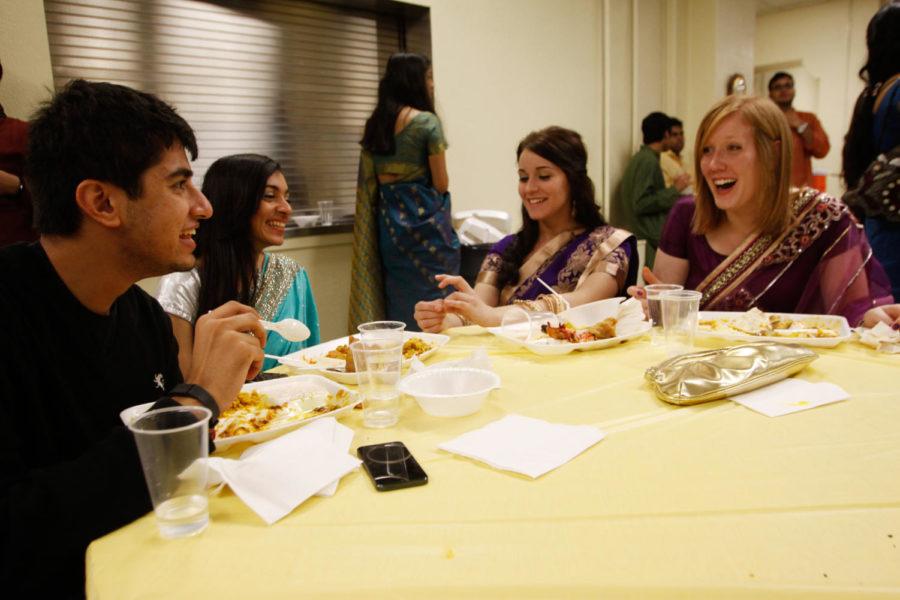Indian students celebrate Diwali with a Bollywood twist
Kaitlin Heinen, right, senior in chemistry; Nicole Valderrabano, senior in aerospace engineering; Devika Tandon, senior in architecture; and Abhijit Patwa, junior in mechanical engineering, sit around and discuss cultural differences during the Diwali festival Saturday, Nov. 9, at the Methodist Church. Diwali is known as the festival of lights for Hindus.
November 11, 2013
Every year, Indian students gather together to celebrate Diwali, the festival of lights and one of the biggest events in India.
Vivek Lawana, graduate student in biomedical sciences and executive officer of the Indian Student Association, described it as one of the most highly celebrated festivals in India, which he compared to the United States’ Thanksgiving.
“On Diwali, families get together, share sweets and decorate the entire house with festive lights,” Lawana said. “India is such a diverse country with many different religions, but Diwali is a night for everyone.”
The Indian Student Association has celebrated Diwali Night at Iowa State for eight years.
“The main goal is to bring all Indian students under one roof, since the entire year is far too hectic to get together properly,” Lawana said. “But we also want to present our culture to Americans and provide them with entertainment.”
The theme of this year’s Diwali was called, “Making of a Bollywood Movie.”
On Saturday, seven dance groups performed a variety of Indian dance types. The all-female group “Sanskriti” showcased traditional folk dances in wild and colorful dresses, while the Bolly-Hop Dance Crew provided the contrast dancing to fast hip-hop and dubstep tunes.
Each dance group, which performed styles such as the Gujarati Dandiya or the traditional Bhangra, was introduced by a short film, illustrating the different members of the groups.
In between the performances, the band Punk Pundits performed songs from Bollywood movies as well as traditional Indian songs.
“Bollywood movies have had a huge impact on Indian and American culture,” Lawana said. “They showcase typical Indian values such as family bonding, dances and weddings.”
Sudhanshu Vyas, graduate student in electrical and computer engineering and president of Hindu Yuva, said Hollywood has taken over almost every film industry in every country except for India.
“In India, Hollywood can’t outsell Bollywood; they have no chance at the box office,” Vyas said.
Vyas said that Indian culture is already very embedded in America.
“The vegan lifestyle…or yoga are gaining popularity here,” Vyas said. “The roots are in India and you can see a growing number of Indian students at ISU, so it’s very nice to see us all celebrate together on Diwali.”
At the event, various skits tied the dance performances together. A Bollywood director, played by Swapnanjan Chatterjee, graduate student in computer science, and his assistant Chotu, played by Lawana, try to make the perfect Bollywood movie.
The skits included the most important plot points of a typical Bollywood movie: the hero crashing into the girl and falling in love with her, defending her against a villain and marrying her in the end. All of the skits were performed in a comedic fashion.
The performance group Rahmanism paid tribute to the famous Bollywood composer A.R. Rahman, who is a two-time Academy Award winner and gained international fame for his score for the movie “Slumdog Millionaire.” The performers danced to a medley of his most famous songs.
After the event, performers and the audience had the chance to gather together to enjoy typical Indian food such as samosa, pulav rice and tandoori chicken.
“This was my first Diwali Night, so it was very unusual but also very interesting for me,” said Marius Dragomiroiu, graduate student in computer science. “I liked the dance performances, they were so powerful and full of energy.”
Edwin Varghese, graduate student in civil, construction and environmental engineering, said this year’s Diwali Night was better than last year’s.
“Every year, Diwali Night has gotten bigger and bigger, so it will be challenging to come up with fresh ideas for next year,” Lawana said. “But there will always be fresh minds with fresh ideas joining the Indian Student Association, so I’m not too worried about that.”
Vyas said that he and Lawana have already started talking about cooperations between the Indian Student Association and Hindu Yuva.
“That would further emphasize the point that we all live under one roof and celebrate Diwali all together, no matter what you believe in,” Vyas said.







